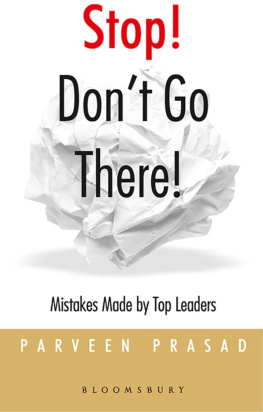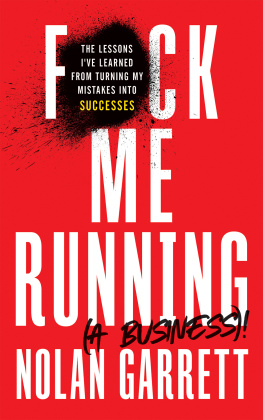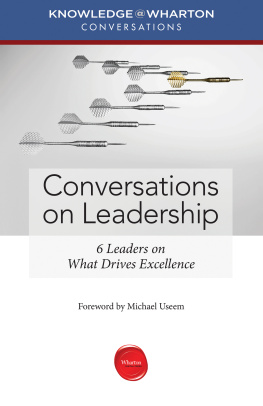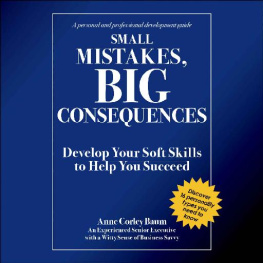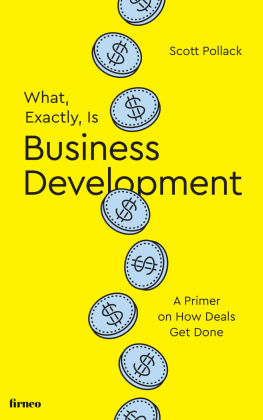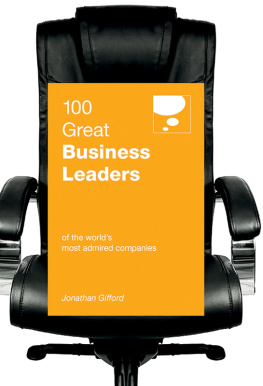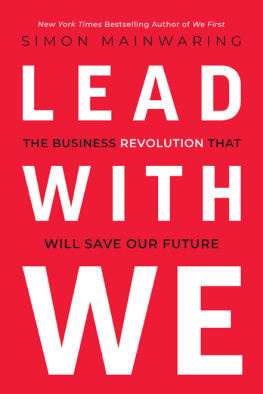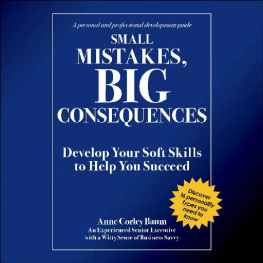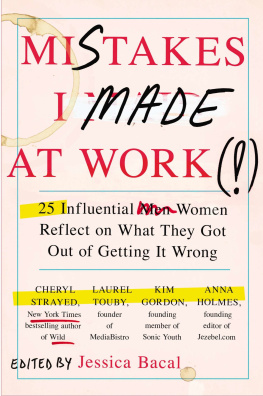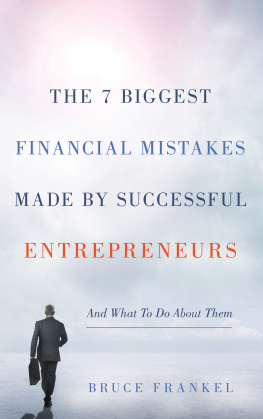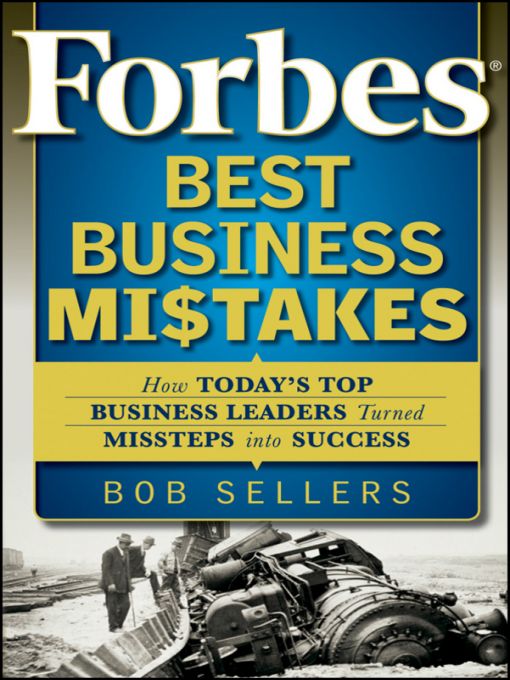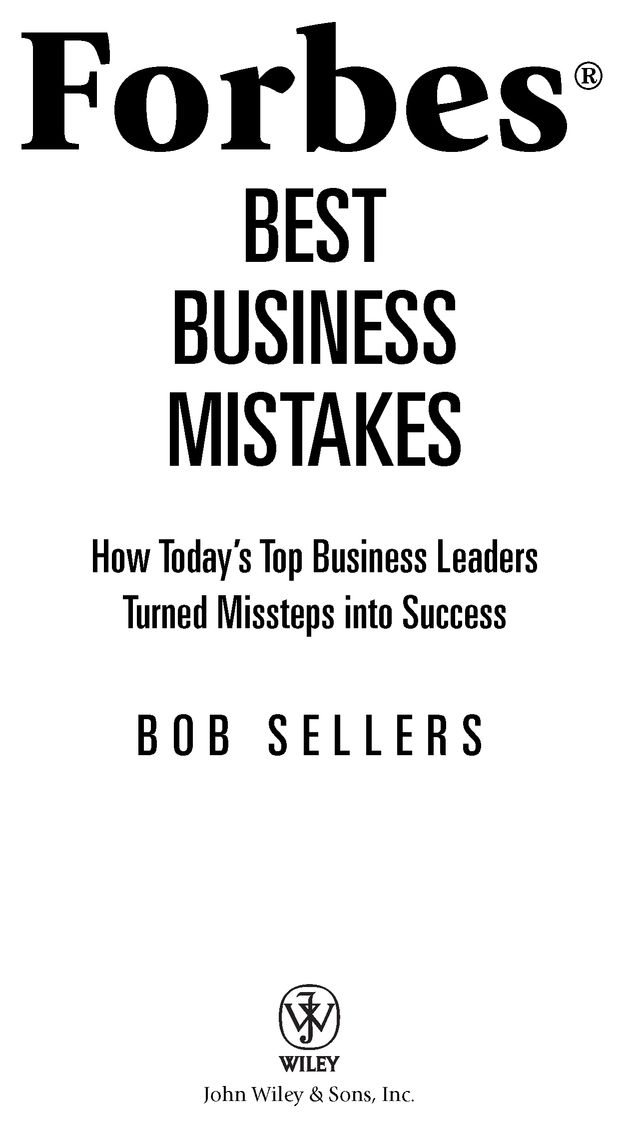Table of Contents
Acknowledgments
First, let me thank my wife, Anna. She always waits to see whether winners of Oscars or Emmys will mention their spouses, so I figured Id better get that out of the way. Shes still the best thing to ever come out of Texas. (Tex-Mex is second, with Lyle Lovett and Joe Ely tied for third.)
I also would like to acknowledge the guidance and support from my John Wiley & Sons editor, Laura Walsh. First, she believed in the project, and then she provided the energy to drive it every step of the way. Without exception she was a ray of sunshine. It was a blessing to have an editor who felt like a friend even as she was doing her job as a professional.
I would also like to thank each of the participants for taking a chance on a topic that not everybody wants to talk about. I hope the profiles and my treatment of their stories warranted their trust and commitment to the project. And of course I want to extend my appreciation to Steve Forbes, whose company has seen fit to put its name on the book. For more than 90 years, the brand has earned widespread respect, and I consider it a privilege to try to live up to those standards.
Finally, there are two little girls who were often told in recent months, Not now, girls, maybe later. Daddys working on his book.
This is later.
About the Author
Bob Sellers has worked as a journalist for 20 years, including nine as an anchor at the national level with CNBC and Fox News Channel. At CNBC, he anchored three hours a day and reported on Wall Street during the dot-com buildup and collapse. At FNC he anchored daytime programs covering general news and international politics, interviewing everyone from Benjamin Netanyahu to Mikhail Gorbachev, and reported live from Baghdad in the early stages of the Iraq war in 2003. As a television anchor and general assignment reporter he has worked in Medford, Oregon; San Antonio, Texas; Seattle, Washington; and Washington, D.C. His columns have appeared in various magazines and newspapers, and he has worked as a financial consultant for Merrill Lynch and Shearson Lehman Hutton. He has appeared as a financial guest on CNBC and Fox Business Network, and has contributed to public radios Marketplace Radio. He was drafted to play professional baseball out of high school by the Kansas City Royals, but chose to attend the University of Virginia instead. He has served on the Board of Advisors for the Universitys Media Studies Department. He now lives in Nashville with his wife, Anna, and their twin daughters. His web site is Bobsellers.net.
Introduction
Mistakes.
We all make them. Theres nothing more personal, and nothing more powerful than the lessons taken from them. If you dont believe me, just ask some of the most accomplished people in America. Thats exactly what I did in Forbes Best Business Mistakes: How Todays Top Business Leaders Turned Missteps into Success.
The strange thing is that these folks willingly talked to me about their missteps. Ive worked for some of the biggest corporations and most successful television networks in the country and Ive discovered that almost nobody else wants to talk about them. At least not in a positive way.
When youre at a dinner party or gathering of professional colleagues, you dont hear someone brag about how they made a huge mistake and it helped get them where they are today. No aspiring top-level executive is going to tap his fork against his wine glass to get the rooms attention and then launch into a recounting of a monumental misstep that led to his professional demiseand his ultimate phoenixlike rise from the ashes to professional heights due to the lessons learned from a career blunder.
No, you usually hear about how smart someone isabout how they made a deft decision or arranged a crafty deal or picked an unknown stock that soared beyond anyones expectations. But it might be a more valuable story to hear what went wrong. From talking to the people in this book, Ive concluded that making mistakes and learning from them is an essential part of the process that leads to success.
Mohamed El-Erian, the PIMCO executive who once managed Harvard Universitys endowment, told me about the value hes seen in other peoples experience. Ive learned from other peoples mistakes, he said, and thats why he was willing to talk to me about his. No one goes through life without making mistakes. Life is too unpredictable and we are imperfect instruments to deal with life. The important thing is not to make the same mistake over and over again. Recognize that its not the end of the world if you make a mistakethese things happen. What is problematic is when you dont learn from the mistake.
Or as Winston Churchill said, All men make mistakes, but only wise men learn from their mistakes.
Success in a business careerany career, reallydoesnt happen because everything falls into place. For the Olympic athlete standing on the medal platform, success didnt come from just showing up on the day of the competition. There were years of putting in the hard work and learning from doing something over and over again and making corrections to what goes drastically wrong and tiny adjustments to what needs refining. And then theres the challenge of doing it when it counts. Theres virtually no activity, athletic or otherwise, in which trial and error doesnt play a role. Why would a business career be any different?
Ive met successful people all over the world, Dave Ramsey told me, athletes, artists, and people who have huge ministries, people who are known on television or whatever, and we perceive their success as somehow being linear, from point A to point B, just a straight line up the mountain. And the truth is its a whole life full of fits and starts. Its a life full of course corrections. Its a life full of bumps on the head so you learn where to not put your head again.
Most of the people in this book were like the rest of us, working in comparative obscurity. They hadnt become household names. They werent on the podium hoisting their gold medals in triumphant celebration for the world to see. They were putting in years of grinding and grueling work to master their professions, training themselves to deal with the obstacles they confronted, and at the ultimate moments of challenge, when they could apply the lessons they had learned through failure, they summoned the best of themselves, made the right decisions, and emerged with consequential career achievements.
And theres something else the people I talked to shared: a focused and unrelenting drive, which is probably why their mistakes couldnt throw them off track permanently. The attitude reminded me of the late football coach Vince Lombardi. He coached the Green Bay Packers to five league titles in nine years, including victories in the first two Super Bowls. He taught his teams to never give up. When they lost a game, he would say, We didnt lose the game; we just ran out of time. It was reflection of Lombardis relentless will to succeed. The difference between a successful person and others is not a lack of strength, not a lack of knowledge, but rather a lack of will. The Super Bowls top prize is now called the Vince Lombardi Trophy.
Best Mistakes
Oh sure, there are books about mistakes. Most are about how to avoid them. You can find books on how to avoid mistakes in buying a house, picking a mate, writing a novel, investing your individual retirement account (IRA), putting on makeup, sailing a boat, speaking Italian, selling a product, speaking in public, getting into college, interviewing for a job, pursuing a legal case, managing subordinates, running a medical practiceeven choosing a horse.


